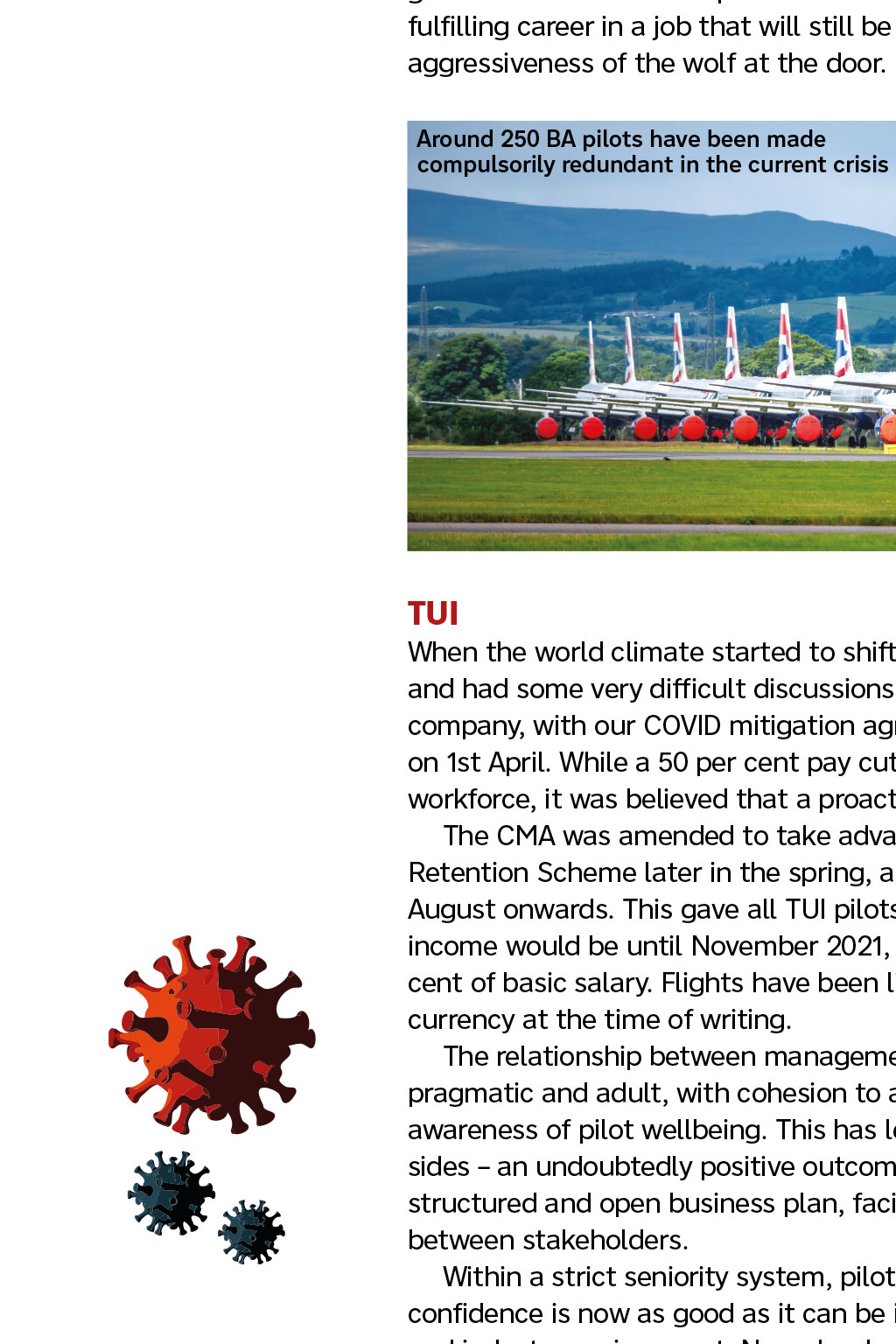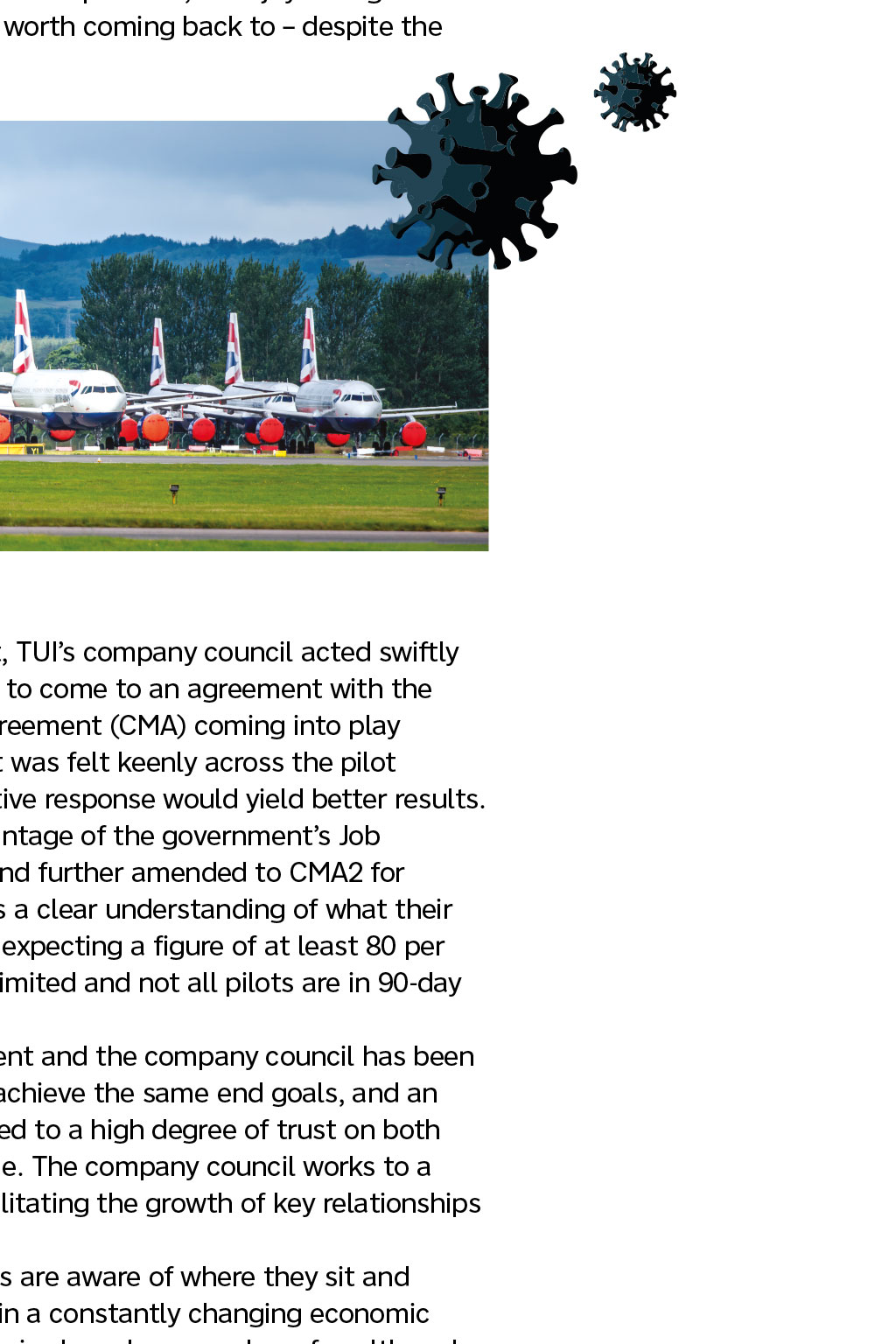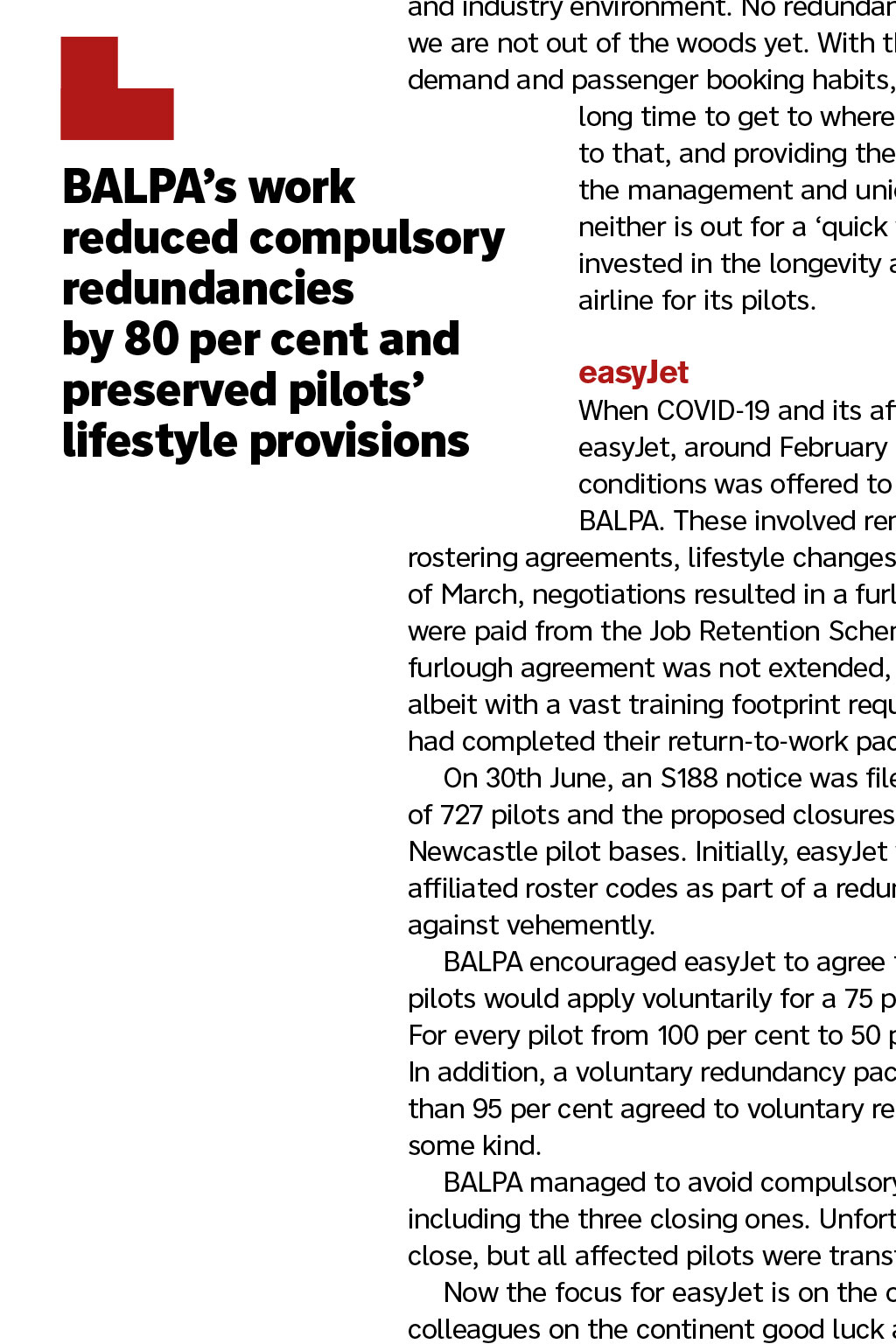
































Navigating COVID-19 By BALPA staff he COVID-19 pandemic and the response to it by governments around the world have had a hugely negative effect on the civil aviation industry. In late October, IATA was predicting revenues across the globe will be down by 66 per cent in 2020 and 46 per cent in 2021, on 2019 results. IATA is suggesting that it is not possible for airlines to cut costs in line with revenues and survive. Against this backdrop, the Log editors asked some of the worst-hit BALPA company councils how they have sought to mitigate the worst effects of the downturn on BALPA members. Virgin Atlantic READ MORE HR1* AND S188* The fallout of the pandemic has been the worst Virgin Atlantic has experienced in its 36-year history. The company council (VACC) engaged in discussions about operations to Shanghai (PVG) the day after a 97 per cent acceptance ballot result for a hard-fought-for pay and lifestyle deal. We convened quickly to discuss options and alleviations that we might offer the company to assist in the short term. We initially thought that a 10 per cent pay cut and advancing the issuing of part-time contracts might be all that was required to protect jobs. How wrong we were! At a special meeting with the CEO, CFO and head of flight crew, the severity of the situation became clear; the business was on track to burn through its cash reserves in a matter of months. We had to grab the bull by the horns, or wed be very quickly turning off the lights for the last time. The company council, with the support of BALPA, worked night and day, and took the difficult decision to sanction a temporary pay (47 per cent) and pension cut (11 per cent from the company contribution) that would reduce our wage bill by approximately 30m for six months (April to September). We hoped that this, along with Virgin accessing the governments Coronavirus Job Retention Scheme (CJRS), would mitigate redundancies. Virgin moved quickly to secure lucrative cargo contracts for the B787 and A350. Volunteers were sought as critical working pilots (CWP) to crew these flights, and the surplus A350 and B787 pilots were placed on furlough, along with the B747 and A330/340 pilots. The VACC adopted the approach of were all in this together, and the pay cuts were the same across the board. It negotiated that Virgin would top up the CWP to match the pay of a pilot who was on furlough receiving their reduced pay plus the 2,500 per month. After the decision to withdraw the A340-600s and B747-400s from service permanently, and park up the A330-200s and 300s in storage, the head of flight crew convened a further meeting and announced that the business needed to reshape and resize but, crucially, attract further investment. The leadership team focused on transforming the business into an efficient, productive and profitable airline. Virgin Atlantic served the HR1* and S188** in May, and proposed a reduction of pilots: down to 460 from 976. The VACC promoted the use of last in, first out (LIFO), but this was rebuffed at every stage. The company stood firm to protect the valuable cargo contracts and ring-fenced the majority of A350 and B787 pilots. After negotiations, a further 90 pilot jobs were secured and kept in strict seniority order from the B747 and A330/340 fleets. The VACC led the way in the creation of a holding pool for displaced pilots. This was applicable to those who had been made compulsorily redundant, with the exception of those who had been identified as having performance or disciplinary issues. As of 1st October 2020, 311 of our friends and colleagues sit in the holding pool, and a further 84 took a voluntary severance package that we negotiated with the company to exit the business. As the business recovers and certain triggers are met, individuals will return to Virgin Atlantic from the holding pool in strict seniority order, and to a pay point that they would have been at if they had remained. The VACC felt this went part way to restoring the underlying principle of LIFO. As the CJRS and our initial, temporary, pay and pension reduction drew to a close, there was still a need to preserve cash in a bid to secure the companys future. We went to ballot and received a 79 per cent accept mandate to continue with reduced pay (20 per cent) and pensions (nine per cent from company contributions) until the end of March 2021. We have also negotiated various triggers that will result in pay and pensions being restored should a recovery be seen ahead of April. We expect that all 550 pilots currently in the business will be reactivated or qualified on their new type by April 2021. As a recovery continues, people will be invited to return from the holding pool. BALPA encouraged easyJet to agree to a part-time ballot We had to grab the bull by the horns or wed be very quickly turning off the lights for the last time British Airways Around 250 pilots made compulsorily redundant, 270 more accepting voluntary redundancy, and a further 300 being supported by their remaining colleagues the past eight months at BA have been brutal. Without BALPA taking the decision to be in the room from the start, however, it would have been significantly worse. When talks began, BA targeted more than 25 per cent of pilot jobs and the introduction of the sort of working practices seen around last years strike. The tone and content of the two Section 188 letters were also good indicators of the direction BA wanted to take without BALPAs involvement, along with a stubborn refusal to countenance enhanced voluntary redundancy terms or even to use the governments Job Retention Scheme. The reality was that the process was controlled by Willie Walsh and IAG, which made negotiating with BA hugely frustrating throughout. Company politics, with how other staff groups were being dealt with, meant barriers were erected at every turn because of BAs wariness of how any progress in negotiations would read across. The company council (BACC) took the view that the priority would be eradicating, or at least minimising, compulsory job losses. A secondary priority was to protect, as much as possible, pilot agreements, expectations and career prospects for future generations. These were not mutually exclusive, because if BA had had its way with crewing levels and rest requirements even more jobs would have been at risk. Some of the BACC had experienced rounds of redundancy negotiations before, so knew that it was horrific for all involved. From the start, BA was clear it intended to tear up pilot agreements. The redundancy agreement, in particular, gave pilots a modified last in, first out order, and then access to a holding pool within the company for 12 months. BA was intent on swift redundancies by fleet and made it clear that zero compulsory redundancy was never going to be an outcome. It also sought, opportunistically, to scrap agreements that had no bearing on the immediate circumstances, such as the scope agreement, scheduling rules, and disciplinary and grievance processes. Collective bargaining is difficult when the debate is over how much better off the members are likely to be, but it is significantly more challenging, and important, when everyone is going to end up worse off. Pilots were worried about their careers, their family and paying their bills. Those who were negotiating had those worries themselves, and carried the weight of responsibility for more than 4,000 others. The only leverage BALPA had was an early deal, which resulted in more than a third of pilot costs being borne by the pilots during April, May and June. This showed that pilots could lead the way, and was used when BA senior managers were under fire from parliament, media and even Piers Morgan for their attitude towards loyal employees. BALPAs work, through elected BACC representatives and National Officer support, reduced compulsory redundancies by 80 per cent, established a clear pathway back to working for BA for all pilots, and preserved pilots most important lifestyle provisions. Compulsory redundancies for BA pilots for the first time indicates the scale of the crisis and is a hugely sad moment in our history. Work will continue to support those affected and, hopefully, get them back into a BA pilot seat as soon as possible, to enjoy a long and fulfilling career in a job that will still be worth coming back to despite the aggressiveness of the wolf at the door. Around 250 BA pilots have been made compulsorily redundant in the current crisis TUI When the world climate started to shift, TUIs company council acted swiftly and had some very difficult discussions to come to an agreement with the company, with our COVID mitigation agreement (CMA) coming into play on 1st April. While a 50 per cent pay cut was felt keenly across the pilot workforce, it was believed that a proactive response would yield better results. The CMA was amended to take advantage of the governments Job Retention Scheme later in the spring, and further amended to CMA2 for August onwards. This gave all TUI pilots a clear understanding of what their income would be until November 2021, expecting a figure of at least 80 per cent of basic salary. Flights have been limited and not all pilots are in 90-day currency at the time of writing. The relationship between management and the company council has been pragmatic and adult, with cohesion to achieve the same end goals, and an awareness of pilot wellbeing. This has led to a high degree of trust on both sides an undoubtedly positive outcome. The company council works to a structured and open business plan, facilitating the growth of key relationships between stakeholders. Within a strict seniority system, pilots are aware of where they sit and confidence is now as good as it can be in a constantly changing economic and industry environment. No redundancies have been made so far, although we are not out of the woods yet. With the changing market, and adapting demand and passenger booking habits, the industry may take an inordinately long time to get to where it was this time last year. Adjusting to that, and providing the right output, requires trust on both the management and union sides. It needs to be clear that neither is out for a quick win and all were, and continue to be, invested in the longevity and sustainability of TUI as a career airline for its pilots. BALPAs work reduced compulsory redundancies by 80 per cent and preserved pilots lifestyle provisions easyJet When COVID-19 and its after-effects started to bite within easyJet, around February and March, a new set of terms and conditions was offered to easyJet pilots directly, bypassing BALPA. These involved removing all safety risk analysis-based rostering agreements, lifestyle changes, and pay reductions. Towards the end of March, negotiations resulted in a furlough agreement, which meant pilots were paid from the Job Retention Scheme for only two months. In June, the furlough agreement was not extended, and pilots were stood back up to work, albeit with a vast training footprint required. Even by October, not all pilots had completed their return-to-work packages, because of the lack of demand. On 30th June, an S188** notice was filed for a head-count reduction of 727 pilots and the proposed closures of Southend, Stansted and Newcastle pilot bases. Initially, easyJet wanted to use sickness and other affiliated roster codes as part of a redundancy matrix, which BALPA fought against vehemently. BALPA encouraged easyJet to agree to a part-time ballot, through which pilots would apply voluntarily for a 75 per cent or 50 per cent contract. For every pilot from 100 per cent to 50 per cent, this would save half a job. In addition, a voluntary redundancy package was offered to all pilots. More than 95 per cent agreed to voluntary redundancy or a part-time contract of some kind. BALPA managed to avoid compulsory redundancies across all bases, including the three closing ones. Unfortunately, the three proposed bases did close, but all affected pilots were transferred to other UK bases. Now the focus for easyJet is on the other European bases. We wish our colleagues on the continent good luck and, hopefully, they will be able to minimise the effects of redundancy and base closures, too. READ MORE HR1* AND S188* *HR1 Advance notification of redundancies: guidance for employers: There is a statutory requirement for the government to assist employees facing redundancy. To do this, employers must notify the Insolvency Services Redundancy Payments Service of potential redundancies. To notify us, you need to complete an advance notification of redundancies form (HR1) and return it to us. www.gov.uk **S188 TU&LR(C) Act 1992, Section 188: (1) Where an employer is proposing to dismiss as redundant 20 or more employees at one establishment within a period of 90 days or less, the employer shall consult about the dismissals all the persons who are appropriate representatives of any of the employees who may be affected by the proposed dismissals or may be affected by measures taken in connection with those dismissals